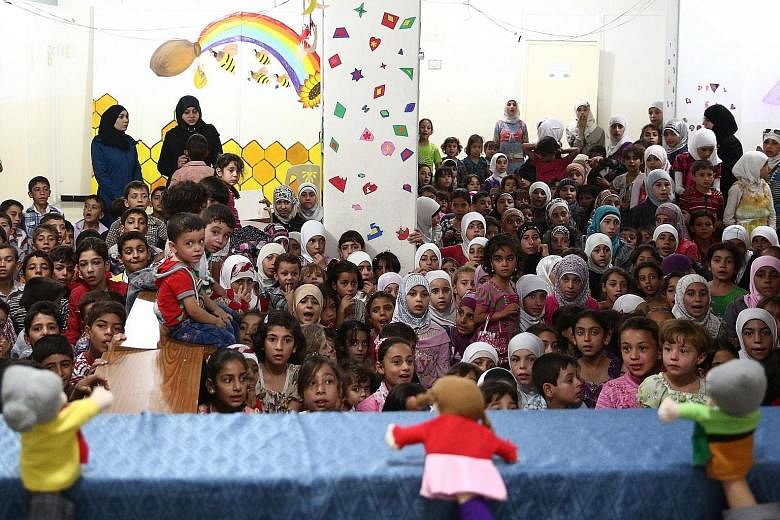US President Barack Obama has urged coalition partners to stay the course in the fight against the Islamic State in Iraq and Syria (ISIS) amid a growing row between the US and Russia over how best to tackle the threat posed by the militant group.
The clash over approaches is also being played out with two competing anti-terrorism meetings at the United Nations.
Speaking at a UN summit on countering ISIS and violent extremism, hosted by the United States on Tuesday, Mr Obama said Syrian leader Bashar al-Assad must go if ISIS is to be defeated.
One day after clashing with Russian President Vladimir Putin over how to handle the crisis in Syria, Mr Obama hosted the counter-terrorism summit, presenting a mixed report card a year since the effort to defeat ISIS began in earnest.
He rallied world leaders to revitalise the coalition campaign against the militants. Malaysia, Nigeria and Tunisia on Tuesday joined the coalition that comprises more than 60 countries, including Singapore.
Mr Obama said that though ISIS still holds key cities such as Mosul, Fallujah and Ramadi, it had lost nearly a third of the populated areas in Iraq it used to control.
In Syria, he said, ISIS has been pushed back from large sections of north-eastern Syria and has also been cut off from almost the entire region bordering Turkey, a key entry point for foreign fighters.
"We've seen that ISIL can be defeated on the battlefield, where there is sound organisation and a government and military that is coordinating with this coalition and with our diplomatic efforts," he said. ISIS is also sometimes called ISIL, IS or Daesh.
But Mr Obama stressed that the battle was far from won. "This is not a conventional battle. This is a long-term campaign - not only against this particular network, but also against its ideology," he said.
A US congressional report released the same day as the anti-ISIS meeting showed that the flow of foreign fighters into Syria was not slowing down. It estimated that some 7,000 have joined in just the past nine months, including more than 250 Americans.
Mr Obama told Tuesday's gathering, held on the sidelines of the UN General Assembly: "In Syria... defeating ISIL requires, I believe, a new leader."
But Russia has maintained the opposite - that Mr Assad is critical to the fight. ISIS talks at this year's UN meeting have thus been largely overshadowed by the dispute between Washington and Moscow over whether Mr Assad should remain the leader of Syria.
Russia snubbed the US-hosted summit on Tuesday, sending only a low-level diplomat "to observe the event". Russian Foreign Minister Sergei Lavrov, in turn, scheduled a ministerial meeting on the same issue to take place in New York on Wednesday (yesterday Singapore time).
Growing Russian military presence in Syria has added complications to the already complex mess in the Middle East. Russia had largely kept at arm's length from the issue until earlier this year when it began sending serious military hardware into Syria to shore up its long-time ally, Mr Assad.
Still, Mr Obama said on Tuesday that the United States was ready to work with Syria's Russian and Iranian allies to "find a political mechanism in which it is possible to begin a transition process".
A two-stage transition to move Mr Assad out of office is one of the options being discussed among US, Russian and Gulf diplomats, Agence France-Presse reported.
US Secretary of State John Kerry, hinting at a possible compromise, said in an interview with MSNBC that Washington could cooperate on the Syria matter if Russia and Iran persuade Mr Assad to stop using barrel bombs against civilians.
The barrel bombs dropped from helicopters by the Syrian regime is believed to have killed more civilians than ISIS' attacks in Syria.
Russia's Ambassador to the UN Vitaly Churkin, meanwhile, blasted the US-led coalition, saying it was an affront to the world body.
"We believe everything must take place in an orderly fashion, in the UN framework, without pulling up the blanket and performing the UN role," he told reporters.
"This initiative seriously undermines UN efforts in this direction."
While the US did not directly respond to the Russians, France rejected Moscow's claims that it was contributing significantly to the fight against ISIS.
French Foreign Minister Laurent Fabius said at a press conference: "You have to look at who is doing what. The international community is striking Daesh. France is striking Daesh. The Russians, for the time being, are not at all."
The French authorities have also launched a criminal investigation of the Assad regime for alleged war crimes committed between 2011 and 2013, sources said.

